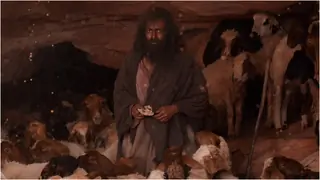| Raju Bharatan's "A Journey Down Melody Lane" paints a riveting picture of the making of our favourite film songs. |
In an industry where journalists get embedded even in peace time, Raju Bharatan is a glorious exception. The film historian's opinions are not dripping with envy or reverence and he doesn't believe in giving a ringside view for he was there right in the midst of the nok jhonk (give and take) when some of the best songs from the Hindi film industry were being given shape. Still he doesn't spare anybody when it comes to painting a picture of Hindi film music in "A Journey Down Melody Lane" (Hay House India). He holds Amitabh Bachchan partly responsible for the demise of melody and Lata Mangeshkar for sabotaging a few careers. Bharatan, whose columns have stirred opinions, says when Amitabh came on the scene, songs began to give way to dialogues on LPs. "There is a difference in getting typecast and type play. I think in Amitabh Bachchan's case, it was the latter. He got sucked into a formula. Yes, he did a 'Kabhi Kabhie' here and there, I agree he got injured at a crucial time in his career but being a trendsetter, he could have done much more. Look at the repertoire of Rajesh Khanna ' 'Anand', 'Safar', ' Bawarchi''.Amitabh almost gave up after 'Alaap' flopped. He was 'angry' even in 'Abhimaan' and 'Milli', which had good music." With Amitabh, Bharatan adds, Salim Javed became the new SJ (a sobriquet reserved for Shanker Jaiskishan till then) and the song situations gradually reduced from four to three to two .
Lata is the reason Bharatan got hooked to film music, but he minces no words when he suggests that the likes of Runa Laila, Hemlata and Sulakshana Pandit suffered because Lata and Asha used their position to choke competition. "People say they didn't have the required talent or versatility; my point is talent also needs time to find expression. Asha took a long time to prove her versatility." But over the years, Bharatan says, his complaint against the sisters has mellowed. "Because I see similar politics in every profession. It is one thing to get to the top and quite another to maintain your position. Shanker Jaiskishan used everything they had to be on top! In fact, apart from chronicling the journey of film music, my attempt is to present the humane side of our musical greats."
So, flipping the pages, we get to know Manna Dey's fears about singing with Bhimsen Joshi, his anger on almost becoming a 'vocal clown' after a number of his songs were picturised on Mehmood. And that Kishore Kumar's gem "Koee Humdum Na Rahaa" which he composed for "Jhumroo" (the film marked his debut as a music composer), was in fact a straight lift, note by note, word by word, from a "Jeevan Naiyya" number sung by his brother Ashok Kumar and composed by the first female composer of Hindi cinema, Saraswati Devi. "However, it doesn't take away anything from his ability as a singer. Not classically trained, he had the rare ability to hit the mike at the right spot every time. One in a million singers has this talent."
Moving on, we have the behind-the-scenes fracas between Lata Mangeshkar and Mohammad Rafi over royalties. According to Bharatan, Rafi was guided by Naushad, who had his own agenda. That apart, Rafi used to address Mangeshkar as 'Maharani' and Lata didn't like it much and the two decided not to sing a duet for three years at the height of their popularity.
Coming to choices, Bharatan rates Talat Mahmood above Rafi as he calls Talat the Urdu symbol of Hindi film music. Of course, nobody can beat Lata. Bharatan says while Geeta Dutt was the most uninhibited singer, Lata didn't place any limitation on the composer. Among the composers he puts C. Ramchandra above Naushad for giving us maximum variety and Sahir Ludhianvi tops his list of lyricists. "His romantic depth was unparalleled." Among those who could not make it to the top, Bharatan picks Sajjad Hussain as the absolute wizard, who didn't get his due. "Madan Mohan always preferred quality over popular appeal. He was among the most honest men in the industry, who didn't take to politics to rise."
Yes, it is all about the popular touch. Bharatan brings out interesting quotes from wizards cribbing about losing their appeal with the masses. At one place O.P. Nayyar says, " Aadmi nahin uska time chalta hai, I was king when I composed trash. I strove for quality only to crash." Bharatan says it reflects the career of every composer of note. "Film music is essentially for the young of the generation. As a composer ages, he goes for quality but loses that appeal with the young audience which the producer/distributor want to draw." S.D. Burman survived this scary feeling. "But he had the advantage of having R.D. Burman by his side from a young age."
He calls R.D. Burman the link between Naushad and A.R. Rahman kind of music. Naushad, he says, represents all melody and Rahman is all sound. He has taken pains to study Rahman's patterns so that he could have a fair opinion on the Oscar-award winner. "Even while remaining within cinema, Rahman has reached out beyond films ' something that even Naushad could not manage to do."
RAJU'S CHOICE
Composers
C. Ramchandra: Maximum variety, the rhythm king
Naushad: Finish and finesse
Shanker Jaikishan: Provided maximum variety after
C. Ramchandra
S.D. Burman: Bringing the folk music of India into films
Madan Mohan: Preferred quality over popular appeal
Male playack singers
Talat Mahmood: Urdu symbol of Indian music
Mohd. Rafi: Tremendous range
Mukesh: Soul of music
Hemant Kumar: Resonance without parallel
Kishore Kumar: Amazing capacity to hit the mike at the right spot.
Female Playback singers
Lata Mangeshkar: Placed no limitation on the composer
Geeta Dutt: Uninhibited style
Asha Bhosle: Took a long time to find her range but when she didwas tremendous
Runa Laila: Brought international style
Shamshad Begum: Brought earthy Punjab to Hindi film music
Lyricists
Sahir Ludhianwi: Romantic depth
Majrooh Sultanpuri: Variety and longevity
Shakeel Budayuni: Master of ghazal
Anand Bakshi: Range
Gulzar: Modernising film poetry
Those who could not make it
Sajjad Husain: Absolute wizard but lacked popular touch
Salil Chowdhury: First to internationalise our film music
Jaidev: Had too much depth to succeed
Khayyam: Master of dressing poetry
Ghulam Mohammed: Could not rise from the second rung.
Printer friendly page
Send this article to Friends by E-Mail






















